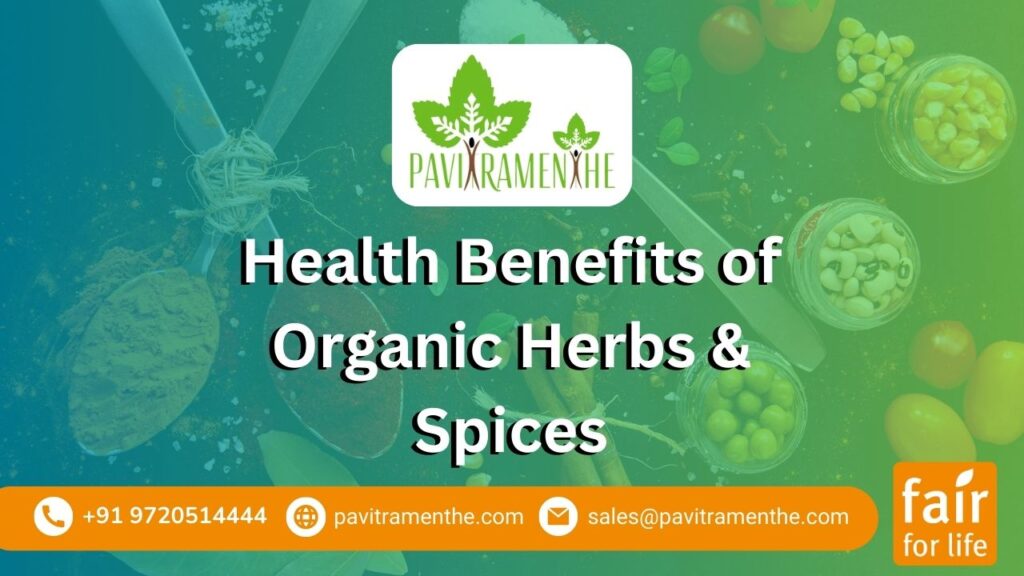Organic herbs and spices have been cherished for centuries not only for their aromatic flavors but also for their incredible health benefits. Packed with essential nutrients, antioxidants, and bioactive compounds, these natural wonders can contribute to overall well-being. In this article, we explore the numerous health benefits of using organic herbs and spices, highlighting their potential to enhance our lives.
Enhancing Immunity Naturally: By incorporating organic herbs and spices into your diet, you can boost your immune system’s natural defenses. Substances like ginger, garlic, and turmeric possess potent anti-inflammatory properties, helping to strengthen immune responses and reduce the risk of chronic diseases.
Promoting Digestive Health: Many organic herbs and spices aid in digestion, alleviating common digestive issues. For example, peppermint can soothe an upset stomach, while fennel seeds help relieve bloating and gas. These natural remedies can support optimal digestion and improve nutrient absorption.
Antimicrobial Properties: Several organic herbs and spices exhibit antimicrobial properties, making them effective against various pathogens. Oregano, thyme, and cinnamon, for instance, possess powerful antimicrobial compounds that can combat bacteria, viruses, and fungi. Including these spices in your meals can aid in preventing infections and promote overall wellness.
Antioxidant Powerhouses: Organic herbs and spices are rich in antioxidants, which play a crucial role in neutralizing harmful free radicals in the body.. By including antioxidant-rich herbs like rosemary, thyme, and sage in your cooking, you can promote cellular health and reduce oxidative stress.
Blood Sugar Regulation: Maintaining stable blood sugar levels is vital for overall health, especially for individuals with diabetes or prediabetes. Certain organic herbs and spices, such as cinnamon and fenugreek, have been shown to help regulate blood sugar levels. Including these spices in your meals may contribute to better glycemic control.
Heart-Healthy Effects: Many organic herbs and spices provide cardiovascular benefits. For instance, garlic has been linked to reducing blood pressure and cholesterol levels. Similarly, cayenne pepper and ginger can improve blood circulation. Incorporating these heart-healthy spices into your diet can contribute to a healthy heart and lower the risk of heart disease.
Incorporating Organic Herbs & Spices into Your Diet:
Incorporating organic herbs and spices into your diet can enhance the flavor of your meals while providing numerous health benefits. Here are some tips on how to incorporate them:
Stock up on a variety of herbs and spices: Start by building a collection of organic herbs and spices in your pantry. Common options include basil, thyme, rosemary, oregano, turmeric, cinnamon, cumin, paprika, ginger, and garlic. Experiment with different flavors to find your preferences.
Use them in cooking: Herbs and spices can be used in various dishes to enhance flavor. Add fresh or dried herbs to soups, stews, sauces, marinades, and dressings. Sprinkle spices onto roasted vegetables, grilled meats, or stir-ties. They can also be used to season grains like rice and quinoa.
Make herbal infusions: Create herbal infusions by steeping fresh or dried herbs in hot water to make teas. For example, mint, chamomile, lavender, or ginger tea are delicious and soothing options. You can enjoy them hot or cold.
Season salads and dressings: Add chopped fresh herbs like parsley, cilantro, or basil to your salads for an extra burst of flavor and nutrients. You can also incorporate herbs into homemade salad dressings by blending them with olive oil, vinegar, and other seasonings.
DIY herb blends: Create your own herb blends to season various dishes. For example, mix dried oregano, thyme, basil, and rosemary for an Italian seasoning blend. Customize the ratios according to your taste preferences.
Use spices in smoothies and beverages: Some spices like cinnamon, turmeric, and ginger can be added to smoothies for added flavor and health benefits. They can also be used to spice up warm beverages like herbal teas or even hot chocolate.
Experiment with herbal remedies: Many herbs have traditional medicinal uses. For example, you can make ginger tea to soothe digestion or chamomile tea to promote relaxation. Research the benefits and potential side effects of each herb before using them for medicinal purposes.
Grow your own herbs: Consider growing your own herbs in a small herb garden or even in pots indoors. This way, you’ll have fresh herbs readily available, and you can enjoy the satisfaction of growing your own food.
Remember to store your herbs and spices properly to maintain their flavor and potency. Keep them in airtight containers away from heat and direct sunlight.
Incorporating organic herbs and spices into your diet not only adds depth and complexity to your meals but also provides additional nutrients and potential health benefits. Enjoy exploring different flavors and experimenting with new combinations to enhance your culinary experiences.
Make herb-infused oils and vinegars: Create flavorful herb-infused oils and vinegars by steeping fresh herbs in olive oil or vinegar. Use these infused oils in salad dressings, marinades, or as a drizzle over cooked dishes to add a burst of flavor.
Spice up your breakfast: Add spices like cinnamon, nutmeg, or cardamom to your morning oatmeal, smoothies, or yogurt bowls. They can add warmth and complexity to your breakfast dishes.
Experiment with international cuisines: Explore the culinary traditions of different cultures that rely heavily on herbs and spices. For example, try Indian curries with a blend of aromatic spices like cumin, coriander, turmeric, and garam masala. Or explore Mexican cuisine with herbs like cilantro and spices such as cumin and chili powder.
Create herb-infused butters: Blend chopped fresh herbs into softened butter to create herb-infused spreads. Spread these flavored butters on bread, melt them over cooked vegetables, or use them to baste grilled meats.
Garnish with fresh herbs: Use fresh herbs as a finishing touch to your dishes. Sprinkle chopped herbs like basil, parsley, or chives on top of soups, salads, roasted vegetables, or pasta dishes to add a pop of color and freshness.
Make herb and spice rubs: Create your own dry rubs by mixing a variety of dried herbs and spices. Rub them onto meats, poultry, or fish before grilling, roasting, or pan-searing for a flavorful crust.
Herbal and spiced beverages: Besides herbal teas, explore other beverage options. Make a refreshing mint lemonade, a spiced chai latte, or a hot apple cider with cinnamon and cloves.
Blend herbs into pesto or sauces: Prepare homemade pesto by blending fresh herbs like basil, parsley, or cilantro with garlic, nuts, olive oil, and Parmesan cheese. Use it as a sauce for pasta, as a spread in sandwiches, or as a topping for grilled meats and vegetables.
Herbs in desserts: Don’t forget that herbs can also be used in sweet dishes. Infuse herbs like lavender, mint, or thyme into desserts like cookies, cakes, or sorbets for a unique flavor twist.\
Read Also-
- Floor Price Discussion with Farmers: Ensuring Fairness and Sustainability
- The Impact of Fair for Life Stores: Driving Positive Change in the Supply Chain:
- Health Benefits of Organic Herbs & Spices: A Natural Path to Wellness
- Conservation of Biodiversity: Our Planet’s Ecological Wealth
- Strong Mandate on Carbon Footprint
What is composting and its benefits

